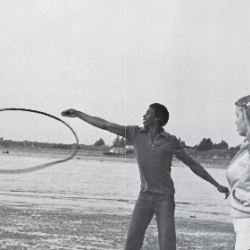Source Institutions
Source Institutions
Add to list Go to activity

In this two-part outdoor activity, learners conduct a population census of squirting clams on a beach or mudflat, and investigate the clams' natural history. During the Clam Hooping activity, learners use giant hoops to take a population census of squirting clams. From the results of this census, the group considers the task of setting up Fish and Game regulations. During the Clam Digging activity, learners gather evidence to answer several questions relating to the natural history of the clams.
- 30 to 45 minutes
- 1 to 2 hours
- $5 - $10 per group of students
- Ages 8 - adult
- Activity, Field Trip, Lesson/Lesson Plan
- English
Quick Guide
Materials List (per group of students)
- 1 data board and marking pen
- 4 boundary markers (flags)
- 1 meter tape
- 1 10 meter length of heavy string or twine marked off in 1-meter intervals
- 1 "Clam Hoop" Equipment Card
- 1 "Use of the Tide Table" Technique Card
- 1 Census Card
- 1 copy of a tide table
- 1 copy of local Fish and Game Regulations
- towels
- Clam Hoops (instructions in PDF)
- Census Cards
- 5" x 8" index cards
- pencils
Subjects
-
Earth and Space Science
-
Earth Structure
- Rocks and Minerals
- Oceans and Water
-
Earth, Moon and Sun
- Tides
-
Earth Structure
-
Life Sciences
-
Diversity of Life
- Animals
-
Ecology
- Ecosystems
- Populations
- Human Impact
-
Diversity of Life
-
Mathematics
-
Data Analysis and Probability
- Data Collection
-
Data Analysis and Probability
-
The Nature of Science
-
The Scientific Process
- About Inquiry
- Asking Questions
- Conducting Investigations
- Gathering Data
- Formulating Explanations
- Communicating Results
-
The Scientific Process
Informal Categories
- Animals
- Nature and Environment
- Outdoor Activity
- Physical Activity
Audience
To use this activity, learners need to:
- see
- read
- be mobile
- touch
Learning styles supported:
- Involves teamwork and communication skills
- Uses STEM to solve real-world problems
- Involves hands-on or lab activities
Other
Components that are part of this resource:
This resource is part of:
Access Rights:
- Free access
By:
Rights:
- All rights reserved, The Regents of the University of California, 1982
